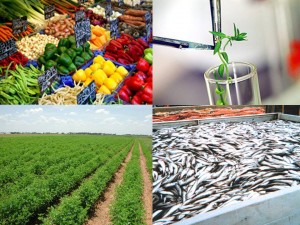FARA Lauds New
Australian Food Security Research Center
The launch of the
Australian International Food Security Centre (AIFSC) last month ushered in a
new momentum in north-south partnership for development. The aim of the AIFSC
is to work though collaborative partnerships to help understand and overcome
barriers to innovation uptake in order to increase agricultural productivity,
income generation and food security. The forum is the first time that such a
high level delegation of African Agriculture Ministers, bureaucrats,
researchers, policy makers and extensionists will come together with Australian
counterparts to focus on issues related to food security in Africa and the
important role that Australia can play.
Source: Eric McGaw, FARA
Executive Director of FARA , Monty Jones and Chairman of the FARA Board
Tiemoko Yo inspecting a FARA-AfDB (DONATA) project potato field in
Rwanda
The in Africa:
Bridging Research and Practice" was opened by Senator Bob Carr,
the Australian Minister of Foreign Affairs who announced a $15 million
partnership with Canada for agricultural research into improving food security
for expectant mothers and children under five in sub-Saharan Africa to address
Africa's high rates of stunted growth in children under five.
According to Senator
Carr, "More than a quarter of sub-Saharan Africans – around 234 million
people – will suffer from a lack of nutrition this year, under-nourishment is
particularly acute among expectant mothers and young children in east and southern
Africa. This research will focus on the needs of these women and children by
examining ways to improve water use and reduce the post-harvest loss of crops
from drought."
According to Jones “to
put the African food security problem in the context of developments elsewhere
in the world, from 1963 -2010, food production per capital fell by 13% in
sub-Saharan Africa but rose 44% in Asia and 48% in South America, even where
food is available, million cannot access or afford it because of underdeveloped
markets and weak infrastructure.”
Speaking on behalf of
the CGIAR, Karen Brooks Director of the CGIAR research programme on policies,
institutions and markets spoke on how pro-poor policies, inclusive institutions
and markets can improve food security, create jobs, raise incomes and generally
improve livelihoods for smallholders and women.
Mellissa Wood,
Director of the CHOGM Australia noted that “African farmers manage complex
systems, often in drought prone areas with risky market access; many Australian
farmers operate under similar conditions and are some of the most innovative
and successful in the world. She noted that a blueprint for improving African
agriculture has been developed (Comprehensive African Agriculture Development
Programme, CAADP) existed and iterated the AIFSC's support to this initiative.
Policy makers present
at the event included the Ministers of agriculture from Burundi, Ethiopia,
Kenya, Malawi, Mozambique and Rwanda. Also present was the African Union
Commissioner for rural economy and agriculture.
The new Centre will build
on Australian farmers’ and researchers’ ingenuity and success, as well as
strong partnerships in Africa to identify innovative strategies to improve food
security. The Centre’s partnership with Canada is part of more than $500
million in long-term Australian commitments to African development. Recent
outcomes include new livestock vaccines for East Africa; tools, fertilizer and
seeds to support 376 000 Zimbabwe farmers and improved harvest conditions for
500,000 African maize farmers.
Source: Eric McGaw, FARA
Executive Director of FARA , Monty Jones and Chairman of the FARA Board Tiemoko Yo inspecting a FARA-AfDB (DONATA) project potato field in Rwanda |






















